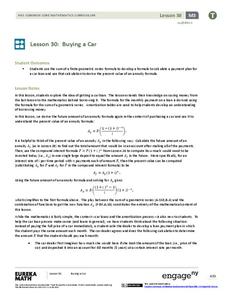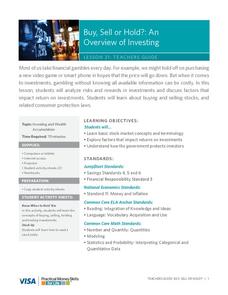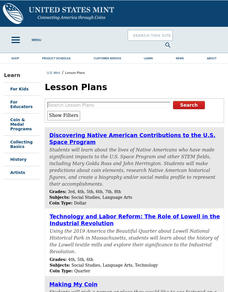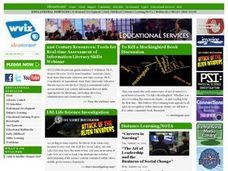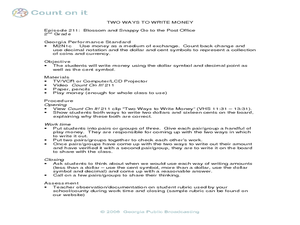Curated OER
Walk-a-thon
Fifth graders solve word problems. In this math lesson, 5th graders read the word problem and determine what is being asked. Students solve the problem and explain how they reached their solution.
EngageNY
The Difference Between Theoretical Probabilities and Estimated Probabilities
Flip a coin to determine whether the probability of heads is one-half. Pupils use simulated data to find the experimental probability of flipping a coin. Participants compare the long run relative frequency with the known theoretical...
EngageNY
Buying a Car
Future car owners use geometric sums to calculate payments for a car loan in the 31st installment of a 35-part module. These same concepts provide the basis for calculating annuity payments.
EngageNY
Linear Functions and Proportionality
Connect linear equations, proportionality, and constant rates of change to linear functions. Young mathematicians learn how linear equations of the form y = mx + b can represent linear functions. They then explore examples of linear...
Visa
Buy, Sell or Hold?: An Overview of Investing
Break down the often-daunting topic of the stock market with this resource, in which pupils learn basic terminology regarding buying and selling stocks, as well as the factors that influence how much return individuals can receive on...
Federal Reserve Bank
Income Taxes
Most adults dread April 15 — tax day! Tax preparation can be intimidating even for adults. Build confidence by leading individuals through the process and then give them a scenario to practice. The exercise uses tax vocabulary to give...
National Council of Teachers of Mathematics
The Game of SKUNK
Do I stand or do I sit? The class plays a dice game where they must decide to either continue to stand and play or sit down and keep their points. After the game, groups discuss individuals' strategies and see connections to the...
Beyond Benign
Final Budget
Be sure you have enough money to build a house. The 14th lesson in a 15-part series teaches young learners to use checkbook registers. They write checks for the amounts they spend on various housing materials and keep track of spending...
Curated OER
How Much Will That House Cost?
What is a mortgage and how do you use it to pay for a house? Young financiers determine how much money is actually spent paying a mortgage payment on a home. They use their math skills to calculate monthly payments on a home given a 30...
Curated OER
Completing Simple Tax Forms
Twelfth graders practice filling out IRS 1040 EZ forms. They discuss various ways people pay taxes. They assess the importance of W-2 forms and apply skills using the IRS tax table to compute how much money is owed or returned.
Curated OER
The Stock Market
Students explore the loss and gain made in the stock market as they invest a sum of money and report the results as percentages instead of points.
Curated OER
Money Madness
Second graders review coins and their values. In this coin recognition lesson, 2nd graders review the coin values as they read 'Smart' by Shel Silverstein. Students use class computer demonstrations to identify the coin's names, worth,...
Curated OER
The Many Faces of Coins
Students examine and discuss the designs on the circulating coins produced by the United States Mint. They read about the woman and child featured on the Golden Dollar. They compare and contrast coins using a Venn Diagram.
Curated OER
Math Lesson: Just How Many is a "Million Dead"?
Students are able to convert large numbers into meaningful ratios. They are able to conceptualize 1 million. Students grapple with the concept of a million. They use this activity to convey the idea of millions by converting war death...
Curated OER
Compounding with 100% Interest Rates
Your young economists will be amazed at the effect of compounding interest more frequently in this collaborative task about making sound financial choices. Learners are walked through the calculations of a couple of examples and then...
Curated OER
Trading Game
Students listen to story about money or coins, and play game to help them solidify their understanding of money. Students focus specifically on coin value and calculating amounts of money up to fifty cents or above, depending on level.
Curated OER
How Rich Is Rich?
Second graders read "Alexander, Who Used to Be Rich, Last Sunday" by Judith Viorst. They watch a video of the book and identify and record amounts of money mentioned in the story. They investigate money-related websites.
Curated OER
Lemonade Stand: Making Money the Old-Fashioned Way
Students run their own lemonade stand and are to figure out what to sell the lemonade at to gain the maximum profit.
Curated OER
Cell Phone Plans
Students relate the use of a cell phone to math. In this algebra lesson, students collect data on the usage of their phones and plot it. They analyze the graph and make predictions based on the rate per minute.
Curated OER
Using An ATM
Learners engage in a lesson on how to use an ATM, or Automated Teller Machine. They see how to bank with an ATM and practice banking using several different types of transactions. This lesson includes a teaching worksheet to practice...
Curated OER
Money
Second graders show combinations for $1.00. In this dollar combinations instructional activity, 2nd graders use nickels, dimes, and quarters to model and count combinations equaling $1.00.
Curated OER
Money Matters
Students explore the concept of money. In this money lesson plan, students role play an economy. Students are divided into three categories- the money factory, construction workers, and the grocery store. Students work cooperatively to...
Curated OER
Two Ways to Write Money
Second graders complete activities to learn about money and how to write money. In this money lesson, 2nd graders watch a video about ways to write money. Students work in groups with play money and come up with two ways to write money....
Curated OER
Using a Calculator
Students use a calculator to solve math problems. In this calculator usage lesson, students get into pairs and familiarize themselves with the keys. Students are then given problems to solve using the calculator. Students do Smart Board...




